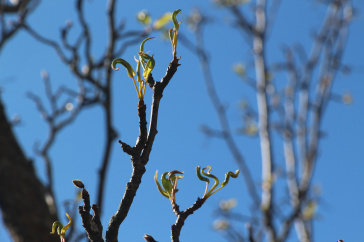The University of New Hampshire inspires innovation and transforms lives in our state, nation and world. More than 16,000 students from all 50 states and 71 countries engage with an award-winning faculty in top-ranked programs in business, engineering, law, health and human services, liberal arts and the sciences across more than 200 programs of study. A Carnegie Classification R1 institution, UNH partners with NASA, NOAA, NSF and NIH, and received $260 million in competitive external funding in FY21 to further explore and define the frontiers of land, sea and space.
UNH Researchers Find Slowdown in Earth’s Temps Stabilized Nature’s Calendar

DURHAM, N.H.—Sometimes referred to as nature’s calendar, phenology looks at the seasonal life cycle of plants and animals and is one of the leading indicators of climate change. It’s the observance of natural occurrences like the first formation of buds and flowers in the spring and the changing colors of leaves in the fall. According to researchers at the University of New Hampshire, when the rate of the Earth’s air temperature slows down for a significant amount of time, so can phenology.
In a study, recently published in the journal Nature Communications, researchers focused on a 15-year period in the early part of this century, when there was a temporary slowdown in the rise of the Earth’s air temperatures. It continued to rise, but more slowly than in the years before and after. Scientists found that during that period, phenology remained relatively constant from year to year, with no appreciable increase in the length of the growing seasons.
“This finding was a big surprise to us because the Earth’s climate is changing and affecting the length of the seasons,” says Jingfeng Xiao, a research associate professor at the UNH Earth Systems Research Center. “Over the past decades we have experienced longer growing seasons, with spring coming earlier and fall coming later, but this wasn’t the situation from 1998 to 2012 in the northern hemisphere.”
Phenology plays a major role in helping to regulate plant photosynthesis, transpiration, and energy exchange. When phenology stabilizes, it’s easier to estimate when to start a garden, when fall foliage will peak and helps life cycles like pollination, migration and mating.
Researchers examined the carbon dioxide exchange between plants and the atmosphere from 56 sites located in forests, croplands, savannas, shrublands and grasslands in the northern hemisphere. They were the first to compare those findings with satellite imagery that indicated the dates of leaf-out (when leaves emerge in the spring) and senescence (when leaves fall and plants die off or enter dormancy in autumn) to estimate the length and timing of the growing season, which stayed about the same for that time period.
Earlier leaf-out and/or later senescence can mean a longer growing season, increase in agriculture production and crop yield, as well as an increase in the amount of carbon dioxide absorbed by plants from the atmosphere. However, it can also mean the need for more water use and could affect stream flow and aggravate water crisis issues.
“It’s not just about plants, many people are also physically affected by phenological trends,” said Xiao. “Anyone suffering from seasonal allergies knows, an earlier spring, or growing season, can mean an earlier allergy season.”
Phenological variations also make it more difficult for scientists to estimate the Earth’s carbon, water and energy exchange between the atmosphere and the Earth’s surface, which can then affect climate change projections.
The scientists admit that the time period they studied, where the Earth’s air temperature rate slowed down, may seem to contrast with other research on global warming but they emphasize that even during this period the Earth’s temperatures continued to rise. They point out that temporary trends like this one require very long datasets — at least a decade or longer — to properly assess big-picture phenological trends.
Funding for this research was provided in part by the National Aeronautics and Space Administration (NASA).
Latest News
-
February 19, 2025
-
February 6, 2025
-
February 5, 2025
-
January 15, 2025
-
January 6, 2025
















































